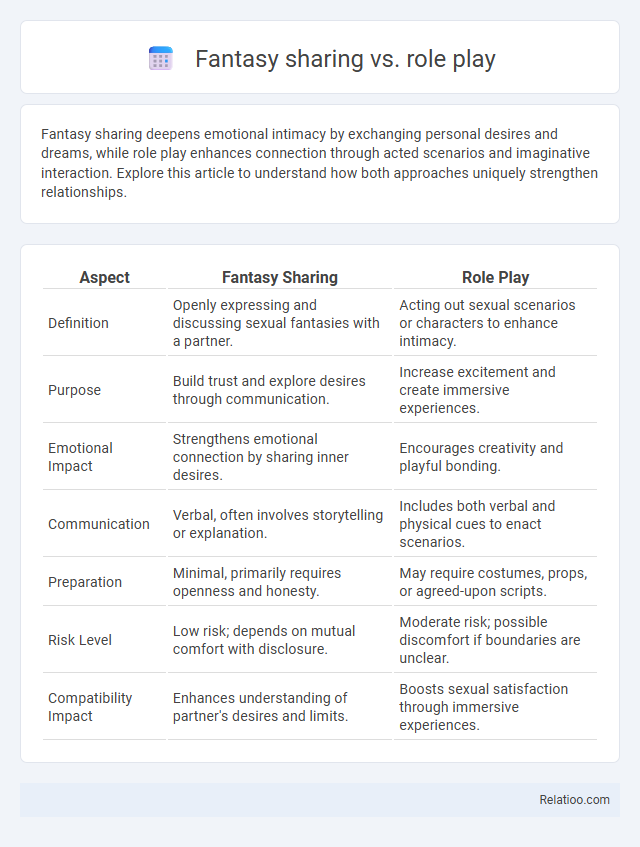Fantasy sharing deepens emotional intimacy by exchanging personal desires and dreams, while role play enhances connection through acted scenarios and imaginative interaction. Explore this article to understand how both approaches uniquely strengthen relationships.
Table of Comparison
| Aspect | Fantasy Sharing | Role Play |
|---|---|---|
| Definition | Openly expressing and discussing sexual fantasies with a partner. | Acting out sexual scenarios or characters to enhance intimacy. |
| Purpose | Build trust and explore desires through communication. | Increase excitement and create immersive experiences. |
| Emotional Impact | Strengthens emotional connection by sharing inner desires. | Encourages creativity and playful bonding. |
| Communication | Verbal, often involves storytelling or explanation. | Includes both verbal and physical cues to enact scenarios. |
| Preparation | Minimal, primarily requires openness and honesty. | May require costumes, props, or agreed-upon scripts. |
| Risk Level | Low risk; depends on mutual comfort with disclosure. | Moderate risk; possible discomfort if boundaries are unclear. |
| Compatibility Impact | Enhances understanding of partner's desires and limits. | Boosts sexual satisfaction through immersive experiences. |
Understanding Fantasy Sharing
Fantasy sharing involves openly expressing and exploring imaginative scenarios with a partner to enhance emotional intimacy, distinct from role play which emphasizes acting out specific characters or scripts. Understanding fantasy sharing requires recognizing it as a collaborative experience where both partners contribute their desires without predefined roles or performances. This practice fosters deeper communication and connection by creating a safe space for mutual vulnerability and creative expression.
Defining Role Play in Relationships
Role play in relationships involves partners adopting specific characters or scenarios to explore fantasies, enhancing intimacy and communication. Unlike general fantasy sharing, which is the verbal exchange of desires, role play requires active participation and enactment, creating immersive experiences. You can deepen connection and trust by embracing role play as a dynamic form of fantasy expression.
Key Differences Between Fantasy Sharing and Role Play
Fantasy sharing involves verbally expressing or describing imaginative scenarios between partners to enhance intimacy, while role play requires actively assuming characters or roles to enact specific fantasies physically. Fantasy sharing primarily stimulates mental engagement and communication, whereas role play emphasizes experiential immersion through behavior, costumes, and settings. The key difference lies in fantasy sharing being a conversational exchange of desires, whereas role play transforms fantasies into interactive, performative experiences.
Psychological Benefits of Fantasy Sharing
Fantasy sharing enhances emotional intimacy by allowing partners to explore desires and vulnerabilities in a safe environment, fostering trust and mutual understanding. Role play extends this process by embodying characters, which can reduce inhibitions and increase confidence, promoting psychological flexibility and empathy. Engaging in fantasy sharing helps alleviate stress and stimulates creative thinking, contributing to improved mental well-being and relationship satisfaction.
Emotional Impact of Role Play
Role play intensifies emotional engagement by allowing participants to embody characters and explore complex feelings in a controlled narrative environment, promoting empathy and self-expression. Unlike simple fantasy sharing, which involves discussing imaginative scenarios abstractly, role play creates immersive experiences that evoke authentic emotional responses and interpersonal dynamics. This heightened emotional impact fosters deeper connections between participants and enriches the psychological benefits of imaginative storytelling.
Communication Techniques for Safe Exploration
Effective communication techniques are essential for safe exploration in Fantasy Sharing, Role Play, and combined Fantasy Sharing and Role Play scenarios. You can establish clear boundaries and expectations through open dialogue, consent check-ins, and using safe words or signals to ensure mutual understanding and comfort. Prioritizing active listening and emotional validation fosters trust, allowing all participants to navigate their fantasies while maintaining emotional safety.
Setting Boundaries: Fantasy vs. Role Play
Setting boundaries in fantasy sharing involves clear communication about personal limits and comfort zones to ensure emotional safety when discussing imaginative scenarios. Role play requires predefined rules and consent to navigate physical and emotional actions within a controlled environment, emphasizing mutual respect and trust. Differentiating the two, fantasy sharing remains verbal and imaginative, while role play incorporates enacted behaviors, making explicit boundaries crucial to maintain positive experiences.
Enhancing Intimacy Through Shared Fantasies
Fantasy sharing enhances intimacy by creating a safe space for partners to express desires and deepen emotional connection through open communication. Role play builds on this foundation by allowing couples to explore fantasies actively, fostering trust and mutual understanding in a dynamic, interactive way. Combining fantasy sharing with role play intensifies intimacy by blending verbal storytelling and physical enactment, making shared desires more vivid and emotionally resonant.
Addressing Common Misconceptions
Fantasy sharing involves expressing and exploring personal fantasies openly with a partner, while role play entails acting out specific scenarios or characters to bring those fantasies to life. Common misconceptions confuse fantasy sharing with role play, assuming both require performance or elaborate setups, yet fantasy sharing can be purely verbal or imaginative without enacted scenes. Understanding these distinctions helps you engage more authentically in your intimate conversations and enhances mutual enjoyment.
Tips for Introducing Fantasy Sharing or Role Play
When introducing fantasy sharing or role play, focus on clear, open communication with your partner to ensure mutual comfort and consent. Establish boundaries and discuss preferences early to create a safe space for exploring fantasies without pressure. You can enhance your experience by starting with simple scenarios and progressively incorporating more detailed elements based on your partner's reactions and feedback.

Infographic: Fantasy sharing vs Role play
 relatioo.com
relatioo.com